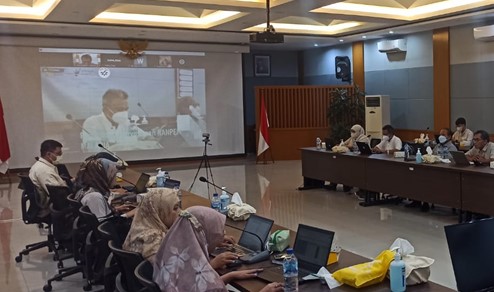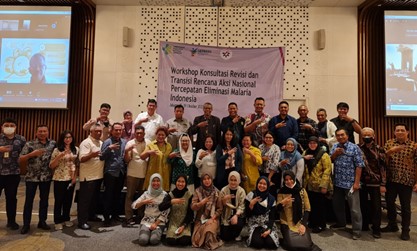The existing National Action Plan on Acceleration of Malaria Elimination in Indonesia (NAP-AMEI) for 2020-2024 was no longer feasible given the circumstances of the malaria programme after the COVID-19 pandemic. Out of the three specific targets set in the NAP-AMEI, only one was achieved.
The Ministry of Health (MOH) had just endorsed the NAP-AMEI 2020-2024 document in February 2020 when the COVID-19 pandemic was declared by WHO. This led to significant disruptions in malaria services, such as a reduction of over 30% in malaria case detection, delays in distributing long-lasting insecticidal nets (LLINs), and stockouts of malaria drugs due to companies reducing the medicine production and transportation delays. These factors contributed to the failure in achieving most of the NAP-AMEI targets.
To assess the post-COVID-19 malaria programme situation, the National Malaria Control Program (NMCP) and WHO conducted a midterm program review (MTR) in August and September 2022. The review revealed that the goal of malaria elimination by 2030 would not be achieved if NMCP continued with "business as usual" interventions. The MTR recommended focusing on Papua, the new capital city (Ibu Kota Negara or IKN) that has mobile and migrant populations (MMPs), and ensuring sustainable financing for malaria. The review also emphasized the importance of innovations, particularly in Papua and areas with MMPs.

One of a series of consultation meetings to develop the NAP-AMEI 2020-2024 amendment. Credit: NMCP
The MTR findings and recommendations informed the revised NAP-AMEI document, which incorporates adjustments to targets, indicators, and introduces new interventions. The amended plan extends the timeline from 2024 to 2026 for achieving elimination in high-endemic districts and specific targets for Papua. The document now also includes a target for the positivity rate of malaria in Papua, from 32% in 2021 to 17% by the end of 2024. In addition, it extends the target for achieving zero high endemic areas from 2024 to 2026, acknowledging the two-year setback caused by the pandemic.
To allow additional time to achieve the targets, a bridging plan for 2025-2026 has been developed. The Government of Indonesia establishes mid-term plans for five-year periods, including the NAP-AMEI: 2020-2024 and then 2025-2029. However, to catch up with the delay due to COVID-19, NMCP developed a bridging plan that focuses on specific targets for 2025-2026.
Both documents were crafted through a series of consultative meetings involving stakeholders from various sectors, including ministries, the private sector, public health offices, non-governmental organizations, civil society organizations and faith-based organizations. WHO provided operational and technical inputs to enhance the plans.
"I hope the revised NAP-AMEI 2020-2024 and its bridging plan 2025-2026 will serve as a reference for all sectors and stakeholders in accelerating malaria elimination in Indonesia," said Dr Imran Pambudi, Director of Communicable Diseases Prevention and Control of the MOH in one of the consultative meetings in Jakarta.
According to him, although perfection may be elusive, Indonesia aims to rectify the shortcomings of the previous document through the new plans. Both plans will accelerate efforts to achieve a malaria-free Indonesia by 2030. Meanwhile, continuous monitoring and evaluation for the implementation of this document is required to ensure the malaria programme is on track.

Stakeholders participating in the consultative meeting to amend the National Action Plan showed symbol of letter “E” for “elimination”. Credit: NMCP
Moving forward, dissemination of the revised NAP-AMEI document and its bridging plan is essential not only for people involved in malaria programme, but also for other sectors that manage social and environmental determinants related to malaria. The community and multisectoral stakeholders’ roles and possible key actions are clearly written in this document, providing guidance for collaborative action to eliminate malaria in the nation.
This activity was supported by the Global Fund to Fight AIDS, Tuberculosis and Malaria.
Written by Dr Herdiana Hasan Basri, National Professional Officer for Malaria, WHO Indonesia
